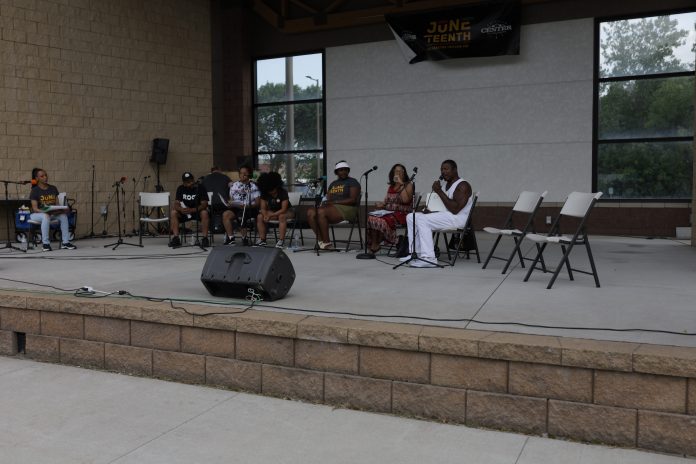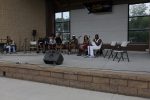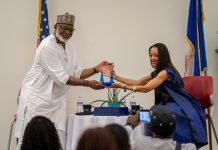

Residents of Brooklyn Center gathered in Centennial Park on Saturday to commemorate Juneteenth (short for June nineteenth) to honor the historic milestone that was the freeing of the final slaves in Texas on June 19, 1865. A highly anticipated facilitated discussion, featuring community leaders and public figures, concluded the activities with a candid discussion about race and trauma.
“It is amazing that we have this freedom, not only freedom from slavery, but freedom to come together in community,” said Matt Branch, executive director of Root Youth and Family Services.
Despite June of 1865 signifying the official end to slavery in America, many have been misled to believe that slavery ended two years prior in 1863, when President Abraham Lincoln enacted the Emancipation Proclamation. In actuality, the law included many exemptions, and slaves in the states of Missouri, Texas, Maryland, Kentucky, and Delaware continued to live a life of bondage. The miseducation surrounding the freedom of slaves is considered one of the reasons why Juneteenth is Black America’s “forgotten” holiday.
The Juneteenth Community Discussion, moderated by Brooklyn Center’s Communications Manager Dr. Angel Smith, featured a series of statements about the Black experience in America. Participants were then asked if they agreed with the stances, and to further elaborate on their responses.
Gary Hines, musical director and producer of three-time Grammy Award-winning choir, “Sounds of Blackness,” said that he did not agree that Juneteenth was strictly a “Black” holiday.
“I have friends of all nationalities who acknowledge the day,” Hines said. “Juneteenth is an Afrocentric, American holiday, for everybody.”
Though Juneteenth popularity has grown over the decades, many outside the Black community do not know its significance. A recent report published in the New York Times found that 60 percent of Americans either knew “nothing at all” or “only a little bit” about the holiday.
LaToya Turk, Brooklyn Center’s interim manager for the Office of Prevention, Health, and Safety said that Juneteenth can resonate with people of all backgrounds.
“We all have our own freedom story, and it may take different forms and look different for different groups, but we can use that as a common bond when celebrating Juneteenth,” said Turk.
Branch responded to a statement on whether Black youth experience fewer hardships than their grandparents did, saying that modern racism is more covert.
“I have to do the work of figuring out who is with me and who is against me,” Branch said.
Tanya M. Bransford, a District Court judge in the Hennepin County District Court, said she believed Black youth are worse off today because of mental health issues.
“There has been a high increase in mental health issues and isolation exacerbated by the pandemic,” Bransford said. “Although it was segregated, people in the ‘40s and ‘50s had more of a sense of community.”
Rising rates of anxiety and depression among youth disproportionately affect Black students, according to EdSource, a California nonprofit that advocates for student success in public schools. In prior decades, the Black youth suicide rate trailed that of their white and Asian counterparts. Today, the rate has more than doubled, surpassing that of all other ethnic groups, with 12 out of every 100,000 Black youth deaths caused by suicide in 2020.
Turk said that it is both easy and difficult to discuss her Black experience with others.
“It really depends on who I am talking to,” Turk said. “Certain people will be offended by these conversations, but the more we have this dialogue, the more we can reach a mutual respect.”
Branch said that while race-based conversations need to be had, he often found them emotionally draining.
“It is definitely triggering at times, because it sort of reminds you of all the struggle and in a way, you are reliving your trauma” Branch said.
Turk argued that more community-driven approaches to issues are needed to promote Black wellbeing.
“One we start to share spaces and have dialogues about what is happening, then we can implement programs to support our people,” Turk said.
Branch said that Juneteenth is most importantly an opportunity to promote Black history and culture to the younger generations for a brighter future.
“Explaining to my children who they are and why Juneteenth celebrates them was such a joyous feeling,” Branch said.
About Panashe Matemba-Mutasa, Mshale Reporter
Panashe is a general assignments reporter. She is a graduate of the University of Minnesota and a UC Berkeley Graduate School of Journalism Class of 2025.










